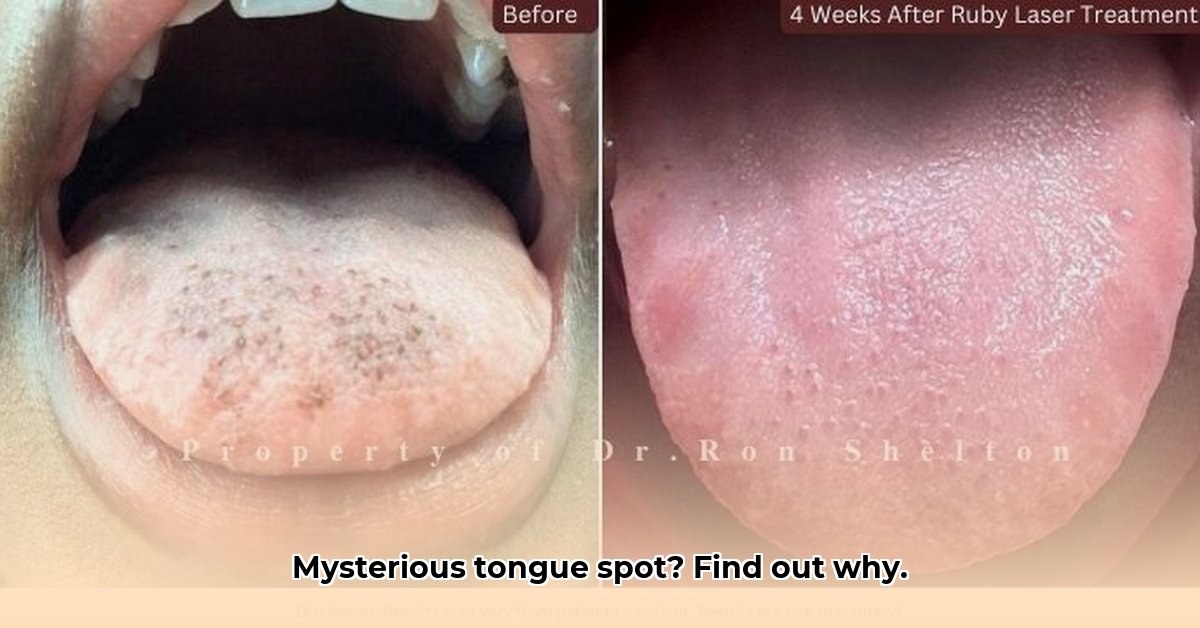# Unraveling Dark Spots on the Tongue: A Comprehensive Guide to Causes, Treatment, and When to Seek Expert Care
Discovering a dark spot on your tongue can understandably cause concern. The implications range from entirely benign to indicative of a condition requiring professional assessment. This comprehensive guide aims to shed light on the potential causes of tongue discoloration, differentiating between harmless scenarios easily addressed at home and those necessitating prompt medical intervention. We will delve into various possibilities, highlighting key symptoms to watch for, and outlining instances when consulting a dentist or physician is imperative. Additionally, we provide practical self-care tips to promote optimal tongue health. However, it is crucial to emphasize that this information serves as a complement to, not a replacement for, a thorough examination by a qualified healthcare provider. Seeking professional evaluation is always recommended to ensure accurate diagnosis and appropriate management. For more on oral health connections, check out this article on [headache connections](https://chaztin.com/can-cavities-cause-headaches/).
## Decoding Dark Spots on the Tongue: Identifying Causes and Recognizing the Need for Medical Consultation
Have you recently observed a peculiar dark spot on your tongue? Such occurrences are fairly common and, more often than not, do not signal any serious underlying health issues. Given the pivotal role of the mouth in maintaining overall well-being, it is prudent to understand the potential origins of these spots. This informative guide will walk you through the possible causes of dark spots on the tongue, help you determine when seeking professional medical advice is necessary, and equip you with the knowledge to take proactive steps toward preserving a healthy mouth. Recognizing the root cause is essential in determining whether you are dealing with oral melanosis or another condition requiring attention.
### Common and Generally Harmless Causes of Tongue Discoloration
Fortunately, in the majority of cases, dark spots on the tongue are not indicative of severe health problems. Think of them as comparable to skin blemishes—occasionally bothersome, yet seldom life-threatening. Here are several common and benign factors that may explain the appearance of those enigmatic dark marks:
* **Inadequate Oral Hygiene:** While the importance of diligent brushing and flossing is well-established, lapses in oral care can occur. The accumulation of bacteria and food debris on the tongue's surface can lead to staining, resulting in a brownish or grayish discoloration.
* **Medication-Related Side Effects:** Certain medications, notably bismuth subsalicylate, a prevalent component in over-the-counter remedies for upset stomach, can induce a dark, sometimes nearly black, coating on the tongue. This phenomenon arises from the interaction between bismuth and saliva. If you have recently commenced a new medication regimen, it could potentially be the underlying cause.
* **Black Hairy Tongue:** Although the name may sound alarming, this condition is relatively common and typically benign. The tongue's surface is covered in small projections called papillae. In some instances, these papillae may elongate excessively, trapping food particles, bacteria, and dead cells. This accumulation can result in a dark, occasionally black or brown, furry-like appearance on the tongue. Rest assured, it is usually painless and readily treatable.
* **Dietary Factors:** Surprisingly, even beloved foods and beverages can contribute to tongue discoloration. Highly pigmented items, such as berries, coffee, dark chocolate, soy sauce or red wine, can temporarily stain the tongue's surface. However, this effect typically diminishes with proper brushing and oral hygiene practices.
It is estimated that approximately 40% of adults may experience some degree of tongue discoloration throughout their lives, often stemming from factors such as diet or medication use. Were you aware of the potential staining capacity of your favored foods and drinks?
### Serious Considerations: When Medical Evaluation of Dark Spots on the Tongue is Warranted
While the majority of tongue discoloration cases pose no significant health risk, certain scenarios necessitate prompt consultation with a healthcare professional. The following situations warrant immediate evaluation by a dentist or physician:
* **Oral Thrush (Candidiasis):** This fungal infection can manifest as white or yellowish patches on the tongue. In some instances, these patches may darken, potentially indicating a more advanced stage of the infection. Oral thrush is frequently accompanied by sensations of soreness or burning.
* **Oral Cancer:** Though relatively uncommon, oral cancer is a severe condition that can occasionally present as a persistent and atypical dark spot on the tongue. Additional symptoms may include non-healing sores, unusual bleeding, numbness, and difficulty with chewing or swallowing. Early detection is paramount for maximizing treatment efficacy.
* **Addison's Disease:** This endocrine disorder affects the adrenal glands, potentially triggering hyperpigmentation on the tongue.
* **Peutz-Jeghers Syndrome:** A rare genetic disorder that can cause dark spots on the tongue, often accompanied by polyps in the digestive tract.
* **Other Underlying Medical Conditions:** In rare instances, a dark spot on the tongue may signify an underlying systemic medical condition. It is therefore essential to consult a healthcare provider to rule out any serious possibilities through appropriate diagnostic testing, such as a complete blood count (CBC) or other relevant assessments.
The crucial factor is remaining vigilant about any changes occurring within your mouth. Any novel spots that are painful, exhibit easy bleeding, expand rapidly, or are accompanied by other concerning symptoms, such as difficulty swallowing or a persistent sore throat, necessitate immediate medical attention.
### Immediate Steps to Take Upon Discovering Dark Spots on the Tongue
Maintaining optimal oral health is essential for overall well-being, with tongue health serving as a critical component. Prioritize scheduling regular dental check-ups and professional cleanings while steadfastly adhering to good oral hygiene practices. Furthermore, promptly consult a healthcare provider should any concerns arise.
### Determining When to Seek Professional Guidance: A Tongue Spot Assessment Checklist
It is always prudent to err on the side of caution. The following checklist will assist you in discerning whether a consultation with a doctor or dentist is warranted:
| Symptom | Significance |
| :-------------------------------- | :------------------------------------------------------------------------------------------------------------------------ |
| Persistent Discoloration | The spot exhibits no improvement despite several weeks of diligent oral hygiene practices. |
| Pain or Discomfort | Experiencing pain, burning sensations, or soreness in the affected region. |
| Bleeding | Any bleeding emanating from the spot should be regarded as a serious indicator. |
| Rapid Growth or Alteration | The spot demonstrates rapid enlargement or changes in its appearance. |
| Swallowing Difficulties | Experiencing challenges in swallowing food or liquids. |
| Tongue/Surrounding Tissue Swelling | Noticeable swelling of the tongue or adjacent tissues. |
| Concurrent Systemic Symptoms | Presence of additional symptoms, such as fever, fatigue, or unexplained weight loss, may signal a more severe underlying condition. |
If even just *one* item on this checklist applies to your situation, promptly schedule an appointment with your doctor or dentist. Early diagnosis can significantly improve the prognosis for numerous conditions. What proactive measures are you prepared to implement to prioritize your oral health?
### Self-Care Strategies: At-Home Approaches
While diligent self-care practices can contribute to improving oral health and potentially mitigating harmless discolorations, it is essential to recognize that these measures are *not* a substitute for professional diagnosis. Consider them as supportive adjuncts rather than primary interventions. Here are several self-care measures you can adopt:
1. **Consistent Brushing and Flossing:** These practices form the bedrock of sound oral hygiene. Aim to brush your teeth twice daily and floss at least once per day.
2. **Gentle Tongue Scraping:** Employ a tongue scraper to delicately eliminate debris and bacteria from the surface of your tongue. Exercise caution to avoid irritation.
3. **Maintain Adequate Hydration:** Consuming ample water aids in keeping your mouth clean and adequately moisturized.
4. **Minimize Staining Agents:** Limit your consumption of highly pigmented foods and beverages known to induce staining, such as coffee, tea, red wine, and berries.
5. **Avoid Tobacco Products:** Smoking and chewing tobacco are known to cause discoloration and irritation of the tongue.
6. **Balanced Diet:** Ensure your diet is rich in vitamins and minerals for overall oral health.
Integrating these habits into your daily regimen can foster a healthier mouth and potentially diminish the occurrence of minor discolorations.
### Diagnosis and Management: A Guide to the Doctor's Assessment and Potential Treatments
The diagnostic process for tongue discoloration typically involves a thorough visual examination conducted by your dentist or physician. They will meticulously assess the spot's appearance, location, and any associated symptoms you may be experiencing.
Depending on their findings, they may recommend further investigations, such as a biopsy (in which a small tissue sample is extracted for laboratory analysis) to rule out more serious conditions. The course of treatment will depend on the underlying cause, potentially encompassing antifungal medications for oral thrush or surgical intervention for specific conditions. Your healthcare provider will formulate a personalized treatment strategy tailored to your unique circumstances.
### Key Takeaway: Timely Action for Tongue-Related Concerns
While the majority of dark spots on the tongue are harmless, seeking evaluation from a medical professional is always prudent. Routine dental check-ups are indispensable for maintaining optimal oral health and facilitating early detection of potential issues. Remember, your mouth plays a vital role in your overall health, so do not hesitate to seek professional assistance if any concerns arise. Maintaining good oral hygiene remains your strongest defense against numerous oral health problems, including those enigmatic dark spots.
According to the American Dental Association, regular dental examinations can facilitate the early detection of oral health issues, when they are typically more amenable to treatment. Are you adhering to your scheduled dental appointments?
Latest posts by Chaztin Shu (see all)
- Compartment Food Containers Make Meal Prep and Lunch Packing Easy - February 10, 2026
- Divided Lunch Containers Revolutionize Your Meal Prep Strategy - February 9, 2026
- Divided Food Storage Containers Transform Meal Prep and Portion Control - February 8, 2026










